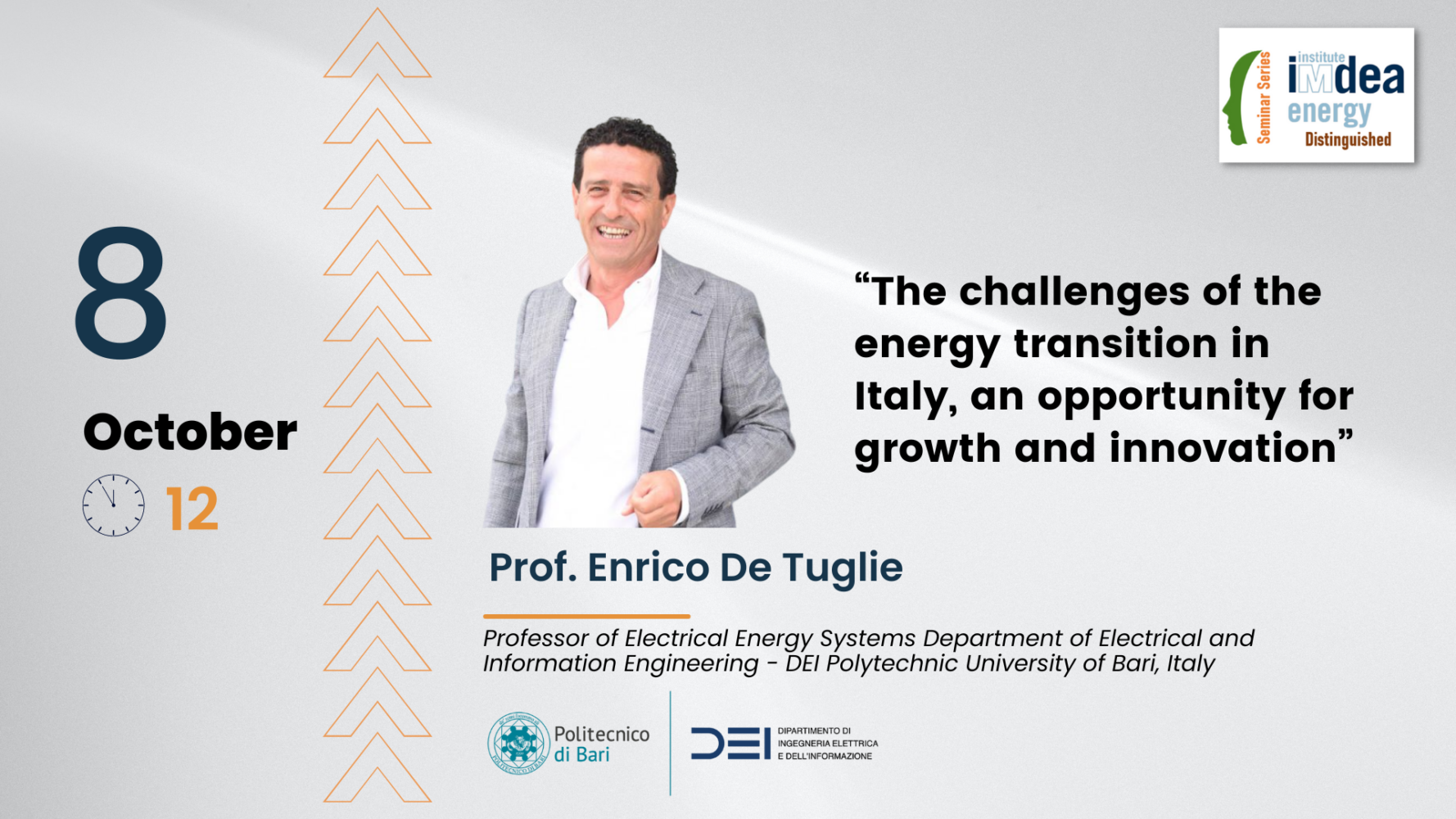Distinguished seminar: “The challenges of the energy transition in Italy, an opportunity for growth and innovation”

Abstract
EU countries have committed to achieving the objective of climate neutrality by 2050 by respecting the international commitments made under the Paris Agreement, through the adoption of the New Green Deal, a strategic plan that aims to combat climate change and global warming through the adoption of specific and decisive measures capable of establishing a new model of sustainable and circular development. The underlying idea is that a climate-neutral Europe will be able to guarantee a more modern, resource-efficient and internationally competitive economy. The transition to climate neutrality will therefore offer potential for economic growth, technological and competitive development, the introduction of new business models and the creation of new markets and better living conditions. The transition from fossil fuels to renewable energy sources, the so-called energy transition, now unavoidable, represents, as well as a challenge, an opportunity for growth and development of our economy. This is a transition that, being rapid and incremental, dictated by the urgent need to contain the rise in global temperature, as well as by contingent situations such as the Russian-Ukrainian war, requires the immediate start of actions to support research, development and innovation. With the exponential growth of RES installations scheduled for 2030 and 2050, the evolution of the energy system towards new sources and vectors and the development of storage, including large-scale and long-term, and for the transport of large quantities of energy over long distances, for the development of a future energy system characterized by adequate levels of resilience, security of supply and redundancy of infrastructures, the key factor will be the development and diffusion of new technologies and solutions that meet the criteria of sustainability, economic competitiveness, environmental protection, safety and protection of the territory. Research will have to promote and support the development of the entire technological chain, identifying short, medium and long-term research priorities based on the maturity of specific technologies, the availability of renewables, the readiness and capacity for change of specific sectors compared to others.
After a brief presentation of the structure and research commitments in the energy sector of the Polytechnic University of Bari, the main initiatives that Italy is adopting to achieve the goal of climate neutrality will be illustrated, with a particular focus on the role of hydrogen, off-shore wind, mobility and the issues of smart sector integration.
Short Bio
Professor Enrico De Tuglie obtained the degree in electrical engineering with Magna Cum Laude in 1994 at the Polytechnic University of Bari. In November 1996 he began his PhD at the same Polytechnic in the area of Electrical Systems for Energy. In January 1999 he held the position of researcher in the area of the electrical system at the Department of Electrotechnics and Electronics of the Polytechnic of Bari. Since December 2003 he has held the role of associate professor at the 2nd Faculty of Engineering of the same Polytechnic and since 2021 he has been Professor Full professor in “Electrical Systems for Energy”. Prof. De Tuglie has held courses on Electrical Energy Systems, Electrotechnics, Network Theory, Industrial Electrical Systems, Operation and Planning of Electrical Energy Systems, Principles of Electrical Engineering, Distribution and use of electricity, Design of electrical systems, Automation of Industrial Electrical Systems, Smart Electric Systems, and Smart Grids and Microgrids.
Prof. De Tuglie’s research activity has mainly focused on Smart Microgrids, impacts of distributed generation on electrical distribution systems and electricity quality control, evaluation of the contributions deriving from distributed generation technologies and energy efficiency actions on energy planning studies, methodologies for the development of control strategies in large-scale power systems, extended real-time control of dynamic security in the transient time scale, competitive electricity markets and congestion management due to dynamic problems, competitive markets and management of system losses, line flows and reactive powers in the transmission system.
Prof. De Tuglie was Visiting Scientist at the Pacific Northwest National Laboratory (PNNL) of the Department of Energy (DOE), dealing with problems related to the integration of resources non-programmable renewable systems in electrical systems.
Prof. De Tuglie was the evaluator of research projects of the Consortium for Electrical Reliability Technological Solutions (CERTS) and of the Electric Power Group (EPG) for the California Energy Commission (CEC) and the California Independent System Operator (CAISO).
Prof. De Tuglie has participated in numerous research programs and has been the principal investigator of numerous research projects financed by public and private companies regarding the management of distribution networks with high penetration of distributed resources, energy saving programs in public lighting systems and water supply systems, management of power system losses in competitive electricity markets, flywheels, performance analysis of photovoltaic systems, smart microgrids.
He is the scientific responsible of the PrinceLab microgrid at the Polytechnic University of Bari.


